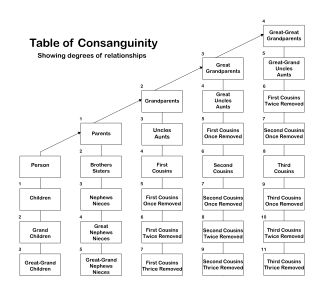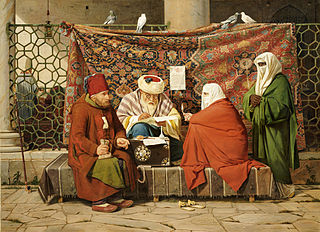Related Research Articles
Incest is human sexual activity between family members or close relatives. This typically includes sexual activity between people in consanguinity, and sometimes those related by affinity, adoption, or lineage. It is forbidden and considered immoral in most societies, and can lead to an increased risk of genetic disorders in children in case of pregnancy.
Incest in the Bible refers to sexual relations between certain close kinship relationships which are prohibited by the Hebrew Bible. These prohibitions are found predominantly in Leviticus 18:7–18 and 20:11–21, but also in Deuteronomy. Jewish views on incest are based on the biblical categories of forbidden relationships and have been subject to rabbinic interpretations in the Talmud. The Karaites reject the authority of Talmudic opinions and interpret the biblical prohibitions differently. The various Christian denominations set their own categories of prohibited incestuous relationships, which have changed from time to time. The laws of many countries regarding prohibited relationships do not necessarily follow the biblical prohibitions nor those of any particular church.
Levirate marriage is a type of marriage in which the brother of a deceased man is obliged to marry his brother's widow. Levirate marriage has been practiced by societies with a strong clan structure in which exogamous marriage is forbidden.

Consanguinity is the characteristic of having a kinship with a relative who is descended from a common ancestor.

In Catholic canon law, affinity is an impediment to marriage of a couple due to the relationship which either party has as a result of a kinship relationship created by another marriage or as a result of extramarital intercourse. The relationships that give rise to the impediment have varied over time. Marriages and sexual relations between people in an affinity relationship are regarded as incest.
In Islamic law (sharia), marriage is a legal and social contract between two individuals. Marriage is an act of Islam and is strongly recommended. Polygyny is permitted in Islam under some conditions, but polyandry is forbidden.

In Islam, nikah is a contract exclusively between a man and woman. Both the groom and the bride are to consent to the marriage of their own free wills. A formal, binding contract – verbal or on paper – is considered integral to a religiously valid Islamic marriage, and outlines the rights and responsibilities of the groom and bride. Divorce in Islam can take a variety of forms, some executed by a husband personally and some executed by a religious court on behalf of a plaintiff wife who is successful in her legal divorce petition for valid cause. Islamic marital jurisprudence allows Muslim men to be married to multiple women.
The intimate parts of the human body must, according to Islam, be covered by clothing. Most of modern Islamic scholars agree that the 'awrah of a man is the area between the navel and the knees, and the 'awrah of a woman is the entire body except the face, hand; exposing the 'awrah of the body is against Islamic law.
Sexuality in Islam contains a wide range of views and laws, which are largely predicated on the Quran, and the sayings attributed to Muhammad (hadith) and the rulings of religious leaders (fatwa) confining sexual activity to marital relationships between men and women. Sexual jurisprudence and marital jurisprudence
Jewish views on incest deal with the sexual relationships which are prohibited by Judaism and rabbinic authorities on account of a close family relationship that exists between persons. Such prohibited relationships are commonly referred to as incest or incestuous, though that term does not appear in the biblical and rabbinic sources. The term mostly used by rabbinic sources is "forbidden relationships in Judaism".
The term jilbāb refers to any long and loose-fit coat or outer garment worn by some Muslim women. Wearers believe that this definition of jilbāb fulfills the Quranic choice for a hijab. The jilbāb is also known as chador by Persian speakers in Iran and Afghanistan. The modern jilbāb covers the entire body. Some women will also cover the hands with gloves and the face along with a niqāb. In recent years, a short visor is often included to protect the face from the tropical sun.
A cousin marriage is a marriage where the spouses are cousins. The practice was common in earlier times and continues to be common in some societies today, though in some jurisdictions such marriages are prohibited. Worldwide, more than 10% of marriages are between first or second cousins. Cousin marriage is an important topic in anthropology and alliance theory.
In law, a prohibited degree of kinship refers to a degree of consanguinity, or sometimes affinity between persons that makes sex or marriage between them illegal.

Erotic lactation is sexual arousal by breastfeeding on a woman's breast. Depending on the context, the practice can also be referred to as adult suckling, adult nursing, and adult breastfeeding. Practitioners sometimes refer to themselves as being in an adult nursing relationship (ANR). Two persons in an exclusive relationship can be called a nursing couple.
Islamic Inheritance jurisprudence is a field of Islamic jurisprudence that deals with inheritance, a topic that is prominently dealt with in the Qur'an. It is often called Mīrāth, and its branch of Islamic law is technically known as ʿilm al-farāʾiḍ.
Breastfeeding is highly regarded in Islam. The Qur'an regards it as a sign of love between the mother and child. In Islamic law, breastfeeding creates ties of milk kinship that has implications in family law. Muslims throughout the world have varied breastfeeding traditions.
Milk kinship, formed during nursing by a non-biological mother, was a form of fostering allegiance with fellow community members. This particular form of kinship did not exclude particular groups, such that class and other hierarchal systems did not matter in terms of milk kinship participation.
Laws regarding incest vary considerably between jurisdictions, and depend on the type of sexual activity and the nature of the family relationship of the parties involved, as well as the age and sex of the parties. Besides legal prohibitions, at least some forms of incest are also socially taboo or frowned upon in most cultures around the world.

Cousin marriage is a form of consanguinity. As of 2003, an average of 45% of married couples were related in Saudi Arabia. While consanguinity is not unique to the Arab or Islamic world, Arab countries have had "some of the highest rates of consanguineous marriages in the world". The bint 'amm marriage, or marriage with one's father's brother's daughter is especially common, especially in tribal and traditional Muslim communities, where men and women seldom meet potential spouses outside the extended family.
Islamic family jurisprudence or Islamic family law or Muslim Family Law is the fiqh of laws and regulations related to maintaining of Muslim family, which are taken from Quran, hadith, fatwas of Muslim jurists and ijma of the Muslims. It contains pubertal, marital, sexual, child upbringing, adoption and fostering, inheritance, criminal and other related subjects. The subject mainly discusses on foster relationship, marriage, divorce, Ila, li'an, Raj'ah, Khul', Zihar, Iddah, custody and maintenance of children etc. From the political aspects, Muslim family law is a part of almost every national constitution of the world regarding religious (Muslim) laws, especially of the Muslim-majority countries.
References
- ↑ "Mahram - Oxford Islamic Studies Online". www.oxfordislamicstudies.com. Archived from the original on January 21, 2021. Retrieved 2021-01-16.
- ↑ Sahih al-Bukhari 5110
- Abdul-Rahman, Muhammad Saed, Islam: Questions and Answers - Jurisprudence and Islamic Rulings, London: MSA Publication Limited, 2007, pp. 22–23.
- Packard, Gwen K., Coping in an Interfaith Family, New York: Rosen Publishing Group, 1993, p. 11.